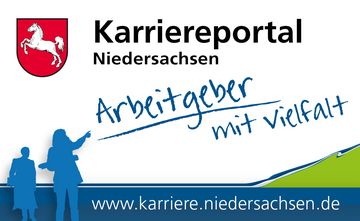Stellenangebote der Universität
News-Feed
Infos zum Bewerbungsverfahren
Datenschutz
Siehe auch
Oldenburg - ein toller Ort zum Leben
Stellenangebote der Universität
Die Universität Oldenburg engagiert sich für Gleichstellung, Diversität, Inklusion und die Vereinbarkeit von Familie und Beruf. Sie ist Unterzeichnerin der Charta der Vielfalt und seit 2004 als familiengerechte Hochschule zertifiziert. Wir begrüßen Bewerbungen von Menschen aller Nationalitäten, ethnischer und sozialer Herkünfte, Religionen, geschlechtlicher Identitäten, sexueller Orientierungen und Altersstufen.
2 PhD Positions in the Quantum Biology and Computational Physics Group
Befristet:
for a maximum of 3 years
Vergütung:
E13
Stellenumfang:
65%
Bewerbungsfrist:
01.04.2025
Wissenschaftliche*r Mitarbeiter*in (PhD)
Befristet:
für drei Jahre
Vergütung:
E13
Stellenumfang:
65%
Bewerbungsfrist:
02.04.2025
Mitarbeiter*in allgemeine Benutzungsdienste
Vergütung:
E4
Stellenumfang:
32,7%
Bewerbungsfrist:
03.04.2025
Wissenschaftliche*r Mitarbeiter*in
Befristet:
für drei Jahre, mit Option auf Verlängerung
Vergütung:
E13
Stellenumfang:
65%
Bewerbungsfrist:
04.04.2025
Wissenschaftliche*r Mitarbeiter*in / Postdoktorand*in am Lehrstuhl für Organization and Leadership
Befristet:
zunächst für 3 Jahre
Vergütung:
E13
Stellenumfang:
100%
Bewerbungsfrist:
06.04.2025
Wissenschaftliche*r Mitarbeiter*in
Befristet:
bis 30.09.2027
Vergütung:
E13
Stellenumfang:
75%
Bewerbungsfrist:
07.04.2025
Referent*in Transfer
Befristet:
bis zum 31.07.2026
Vergütung:
E13
Stellenumfang:
50%
Bewerbungsfrist:
07.04.2025
Studienassistent*in
Befristet:
bis 30.09.2027
Vergütung:
E9a
Stellenumfang:
100%
Bewerbungsfrist:
07.04.2025
1 Ausbildungsplatz für den Beruf „Fachkraft für Veranstaltungstechnik"
Befristet:
Ausbildungsdauer
Vergütung:
Azubi-Vergütung
Stellenumfang:
100%
Bewerbungsfrist:
08.04.2025
Technische*r Mitarbeiter*in im Bereich Meerestechnik, Robotik oder Autonome Systeme
Vergütung:
je nach Qualifikation bis E11
Stellenumfang:
75%
Bewerbungsfrist:
09.04.2025
Lehrkraft für besondere Aufgaben, Englischsprachige Literatur- und Kulturwissenschaft
Vergütung:
E13
Stellenumfang:
60%
Bewerbungsfrist:
10.04.2025
Leitung der Abteilung Benutzungs- und Informationsdienste (Bibliotheksoberrat/-rätin)
Vergütung:
A14
Stellenumfang:
100%
Bewerbungsfrist:
10.04.2025
Wissenschaftliche*r Mitarbeiter*in in Slavistischer Literaturwissenschaft
Befristet:
zunächst für 3 Jahre
Vergütung:
E13
Stellenumfang:
50%
Bewerbungsfrist:
11.04.2025
Wissenschaftliche*r Mitarbeiter*in im Projekt „Kontaktstudium: Anerkennung und pädagogische Kompetenz in der Migrationsgesellschaft“
Befristet:
für zunächst drei Jahre
Vergütung:
E13
Stellenumfang:
100%
Bewerbungsfrist:
15.04.2025
Biologisch-technische*r oder Chemisch-technische*r Assistent*in
Befristet:
bis 31.07.2027 mit Aussicht auf Verlängerung
Vergütung:
E9a
Stellenumfang:
50%
Bewerbungsfrist:
15.04.2025
Wissenschaftliche*r Mitarbeiter*in in der Arbeitsgruppe Navigationsbiologie
Befristet:
zunächst für 3 Jahre
Vergütung:
E13
Stellenumfang:
100%
Bewerbungsfrist:
15.04.2025
Postdoc in the area of open science methods and metascience in cognitive neuroscience
Befristet:
The position will run for 3 years.
Vergütung:
E13
Stellenumfang:
50%
Bewerbungsfrist:
15.04.2025
Wissenschaftliche*r Mitarbeiter*in
Befristet:
für 3 Jahre
Vergütung:
E13
Stellenumfang:
65%
Bewerbungsfrist:
20.04.2025
Mitarbeiter*in in der Poststelle in Teilzeit
Vergütung:
E5
Stellenumfang:
50%
Bewerbungsfrist:
20.04.2025
Mitarbeiter*in im Verwaltungsdienst
Vergütung:
E6
Stellenumfang:
100%
Bewerbungsfrist:
21.04.2025
Wissenschaftliche*r Mitarbeiter*in in der Abteilung Pflegewissenschaft
Befristet:
für 3 Jahre
Vergütung:
E13
Stellenumfang:
65%
Bewerbungsfrist:
22.04.2025
Bibliotheksamtfrau / Bibliotheksamtmann
Vergütung:
A11
Stellenumfang:
100%
Bewerbungsfrist:
22.04.2025
Wissenschaftliche*r Mitarbeiter*in Postcolonial Studies
Befristet:
für 3 Jahre
Vergütung:
E13
Stellenumfang:
65%
Bewerbungsfrist:
27.04.2025
Wissenschaftliche*r Mitarbeiter*in Epidemiologie oder Biometrie / Postdoc
Befristet:
vorerst für 4 Jahre, siehe weitere Informationen
Vergütung:
E14
Stellenumfang:
100%
Bewerbungsfrist:
28.04.2025
Wissenschaftliche*r Mitarbeiter*in
Befristet:
für 3 Jahre
Vergütung:
E13
Stellenumfang:
50%
Bewerbungsfrist:
30.04.2025
Wissenschaftliche*r Mitarbeiter*in Ethik der Digitalisierung
Befristet:
Zunächst bis zum 31.07.2028
Vergütung:
E13
Stellenumfang:
65%
Bewerbungsfrist:
30.04.2025
Wissenschaftliche*r Mitarbeiter*in im Institut für Kunst und visuelle Kultur
Befristet:
bis zum 30.09.2028
Vergütung:
E13
Stellenumfang:
50%
Bewerbungsfrist:
30.04.2025
Doctoral candidates or research assistants on the topic of self-explanatory digitally controlled systems
Befristet:
to three years
Vergütung:
E13
Stellenumfang:
100%
Bewerbungsfrist:
01.05.2025
Wissenschaftliche*r Mitarbeiter*in in der Arbeitsgruppe Geoökologie
Befristet:
bis zum 30.11.2027
Vergütung:
E13
Stellenumfang:
60%
Bewerbungsfrist:
05.05.2025
Wissenschaftliche*r Mitarbeiter*in
Befristet:
bis 30.09.2028
Vergütung:
E13
Stellenumfang:
75%
Bewerbungsfrist:
05.05.2025
Wissenschaftliche*r Mitarbeiter*in
Befristet:
bis 31.03.2029
Vergütung:
E14
Stellenumfang:
100%
Bewerbungsfrist:
05.05.2025
W2-Professur für Theoretische Physikalische Ozeanographie
Wertigkeit:
W2
Stellenumfang:
100%
Bewerbungsfrist:
15.06.2025


